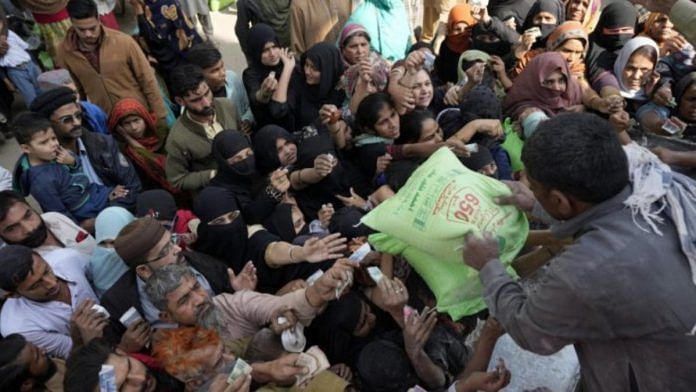Mohammad Ali Jinnah’s “two-nation theory” was not about Hindus and Muslims but the “elite and poor, rulers and subjects… kings and paupers,” prominent British-Pakistani barrister Khalid Umar tweeted Sunday while the cash-strapped country desperately looked for an economic bailout to stay afloat.
Umar’s tweet shows long queues at gas stations and in front of vegetable vendors.
He contrasted those photos with a short video of a crowd in front of Canadian coffeehouse Tim Hortons, which opened its first outlet in Lahore on Saturday. According to reports, the outlet managed excellent opening day sales; some said it was the highest in 61 years.
Two Nation theory of #Jinnah. The reality! It was not about Hindus and Muslims but the Elite & Poor, Fauj & Awam, Rulers & Subjects, Kings & Paupers. India get rid of feudalism & in Pakistan it has 1000 lives & million faces. Poor line up for Flour, Elite for Tim Hortons pic.twitter.com/qdnLOllyXY
— Khalid Umar (@ukilaw) February 12, 2023
While the queue outside Tim Hortons was long yet orderly, Twitter users were reminded of those who had been trampled upon in unruly files, breathing their last while trying to get a bag of subsidised flour.
IMF demands, tough time for Pakistan
Lurching through a terrible economic crisis in decades—unprecedented in the country’s post-Independence history—Pakistan is gearing up to virtually resume talks with the International Monetary Fund (IMF) on Monday, to unlock funding critical to its economic health.
The IMF, which cleared a $6 billion bailout in 2019, and topped it up with another $1 billion last year for the devastating floods, suspended disbursements in November due to Pakistan’s failure to progress on fiscal consolidation.
The IMF’s demands that the country control its budget deficits, and move toward a market-dominated exchange-rate regime. Following this, foreign exchange companies removed a cap on the exchange rate at the end of January because it was causing artificial distortions in the economy, they said.
This triggered a steep fall in the Pakistani rupee’s value against the US dollar, which today stands at Rs 270.6.
The country is not doing very well on forex, with its central bank announcing last week that reserves had dipped by $170 million to $2.9 billion – the lowest since 1998 and not enough to cover the cost of three weeks of imports.
Prime Minister Shehbaz Sharif even told his colleagues last week that the IMF was giving the country a “tough time” during this “unimaginable” economic crisis.
In a meeting of civil and military leaders in Peshawar, Sharif had said: “The conditions (laid out by the IMF) we have to fulfill are beyond imagination,” and admitted he had no option but to accept them.
Pakistan’s woes have been compounded by decades-high inflation, which economists fear may worsen since most of the country’s critical exports are paid for in dollars. Inflation is now at a 48-year high.
Also read: With default or harsh economic measures its choices, Pakistan stuck between rock & a hard place
Apart from sagging growth, high-interest rates and sky-high inflation of over 27 per cent, Pakistan’s fiscal stability has been undermined by several other causes. Analysts say, these are “weak governance, political instability, weakening investor confidence, corruption and pork-barrel politics” among others.
“Pakistan is highly import-dependent, particularly with regard to energy, which renders it acutely vulnerable to hikes in global oil and gas prices. The pandemic did not help, and Pakistan’s tense relations with India continue to deprive it of a potentially transformative trading and investment partner,” said John Ciorciari, professor and associate dean for research and policy engagement at the University of Michigan’s Gerald R. Ford School.
Add to that high military budgets and even unaccounted-for spending on their leaders’ security. According to reports, former Prime Minister and Pakistan Tehreek-e-Insaf (PTI) chief Imran Khan’s helicopter rides cost the national kitty Rs 1 billion.
The IMF’s $6.5 billion package may not be enough to replenish Pakistan’s coffers, a report said.
The country is still counting the cost of the ruinous floods. For instance, around 35 per cent of the cotton output of the country – the world’s fifth largest cotton producer— was destroyed.
Meanwhile, Pakistan is desperately trying to raise money ahead of the IMF talks. Its cabinet on Sunday approved a plan to increase power tariff, end subsidies and a revised circular debt management strategy in this sector.
“According to the plan okayed by the cabinet yesterday, to be presented to the IMF, the government will jack up power prices by Rs7.91 per unit in four quarterly adjustments,” Geo News reported.
The report added that the government ended the electricity subsidy given to exporters of Rs 65 billion from March 2023.
Pakistan’s international bonds slipped again on Monday after having suffered sharp falls on Friday following the deadlock with the IMF.
But its Finance Secretary Hamed Yaqoob Sheikh told Reuters in a text message: “Duration (of the IMF talks) cannot be confirmed but we intend to wrap these up at the soonest.”
(Edited by Ratan Priya)



